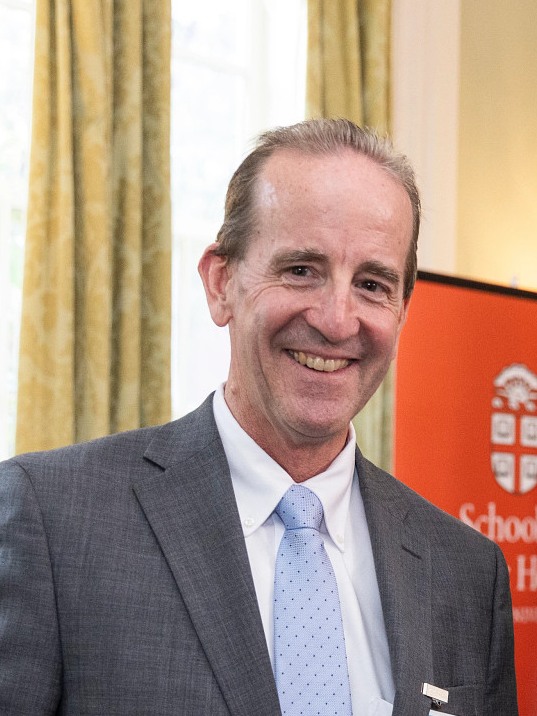Steinfeld praised the diversity of practitioners Watson has brought to campus. "In recent years," he said, "students could study with former Republican National Committee chairman Michael Steele one semester and former Democratic National Committee chairman and Secretary of Labor Tom Perez the next. Similarly, students could examine the national security implications of cyber technologies with former U.S. Congressman Jim Langevin and then follow that up with an in-depth analysis of the human rights implications of these same technologies with renowned human rights lawyer Malika Saada Saar."
Deeper structural changes at Watson accompanied this shift in emphasis. In 2019, the institute established its new undergraduate International and Public Affairs (IAPA) concentration, replacing separate concentrations in international relations, development studies, and public policy. Steinfeld noted that the change "did not come easily, as the legacy concentrations had many positive attributes, not to mention strong advocates."
Steinfeld said the change has improved undergraduate education at Watson, with students less siloed into self-selecting groups. "The unified concentration delivers an education that brings together and intermingles communities of students representing all manner of perspectives and backgrounds that had previously tended to self-segregate across the legacy concentrations," he said.
Another benefit of the change is that the institute no longer needs to outsource its curriculum to other departments. "Our courses offer a far-ranging, globally comparative curriculum taught by our own faculty predominantly in small, seminar-sized classes," said Steinfeld. "This creates the kind of learning environment that facilitates better faculty-student mentoring relationships and a more seamless integration between empirical research, teaching, and engagement with real-world problems."
Graduate education at Watson has undergone a similar transformation. The Master of Public Affairs (MPA) program was established just months before Steinfeld became Watson's director. The program has grown and changed dramatically in recent years. Changes include a new curriculum that couples rigorous training in the analysis and practice of public policy with equally thorough training in specific policy domains. The focus on experiential learning carried over to the MPA program, especially through its "Policy in Action Project," a core course in which students work in small teams and apply their skills to address policy-related challenges in a professional setting. The program offers MPA students the opportunity to get hands-on experience solving real-world problems by working with partner organizations in the government, nonprofit and private sectors.
At the Ph.D. level, Watson's Graduate Program in Development (GPD), which grew out of a National Science Foundation training grant that ran from 2010 to 2016, brings together Brown University scholars from a range of departments to think about questions of development in ways that build on but move beyond traditional disciplinary boundaries.
Steinfeld also spearheaded efforts to increase collaborative ties between Watson and the military based on the belief that a liberal arts education is well served by having members of the military on campus. Begun in 2021 and partially funded by the Carnegie Corporation, the Watson Military Fellows Program has hosted military officers from the U.S. Air Force, U.S. Army, U.S. Marine Corps and U.S. Navy, as well as an officer from the Army of the Republic of Korea.
Steinfeld maintains that both institutions benefit from the connection by exposing Brown students and faculty, as well as the visiting military officers, to viewpoints they may not typically encounter in their respective silos. He called the program "essential to Watson's overall diversification efforts." "The inclusion of these individuals," he said, "like those from other distinctive communities not traditionally associated with, or even welcomed onto, Ivy League campuses, is vital for our academic excellence and our realization of the full value of a liberal arts education."
The institute's ambitious new programs and initiatives — which, in addition to the Military Fellows Program, include a new Center for Human Rights and Humanitarian Studies and Climate Solutions Lab — necessitated a substantial expansion of Watson faculty. Since 2016, the institute has added 11 tenure-stream professors, two professors of the practice, three lecturers and ten senior fellows, while its Postdoctoral Fellows Program has grown to include 14 early-career scholars.
As the institute's research and teaching footprint expanded, its physical footprint also needed to grow. Stephen Robert '62 Hall — designed by architect Toshiko Mori — opened in December 2018 and provided much-needed space for the institute's expanding array of research centers, initiatives and academic programs.
Steinfeld said the new space was "specifically designed to emphasize student study areas, convening places, and open areas for general social interaction" and "has made Watson more welcoming than ever before to constituencies from all over campus and permitted us to more fully realize our core belief that the best education is social in nature."
Under Steinfeld's leadership, the institute also added professional staff in three critical areas: Communications to facilitate expanding capabilities in podcasting, videography and social media; the MPA program to build out capabilities, especially in recruiting and career placement; and the IAPA program to accommodate the curricular management needs of what now stands as one of Brown's largest undergraduate concentrations.
Steinfeld said Watson's steady growth trajectory, which includes continuing to add faculty and staff, along with new programs and public engagement initiatives, will continue with the launch of the new School for International and Public Affairs. "We will continue to do all the things necessary to embody true excellence in a distinctive Brown fashion," said Steinfeld. "After June 30, as a regular faculty member, I look forward to seeing what will continue to evolve in our academic community."
